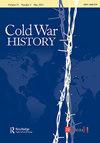The first generation of Cuban students in the 1960s Soviet Union: shaping a revolutionary ‘culture of militancy’
IF 0.3
2区 历史学
Q1 HISTORY
引用次数: 0
Abstract
ABSTRACT After breaking away from ‘Stalin’s isolationism’, Moscow saw the 1959 Cuban Revolution as an opportunity to expand its influence and granted Cubans numerous scholarships for postgraduate and technical training in the USSR. Facing international hostility, preparing new specialists was crucial to Cuba’s development. However, for many uneducated Cuban students, in addition to serious external obstacles (weather, language, depression), studying in the USSR was a highly politicised experience. They formed colectivos and were called on to induce a ‘revolutionary morality’ through incentives and sanctions; they also received ongoing political orientation from the embassy, shaping a well-entrenched ‘culture of militancy’.20世纪60年代苏联的第一代古巴学生:塑造革命的“战斗文化”
在摆脱“斯大林的孤立主义”后,莫斯科将1959年的古巴革命视为扩大其影响力的机会,并为古巴人提供了许多奖学金,供他们在苏联接受研究生和技术培训。面对国际社会的敌意,培养新的专家对古巴的发展至关重要。然而,对于许多未受过教育的古巴学生来说,除了严重的外部障碍(天气、语言、萧条)外,在苏联学习是一种高度政治化的经历。他们组成了集体,并被要求通过激励和制裁来引导“革命道德”;他们还从大使馆得到持续的政治指导,形成了一种根深蒂固的“战斗文化”。
本文章由计算机程序翻译,如有差异,请以英文原文为准。
求助全文
约1分钟内获得全文
求助全文

 求助内容:
求助内容: 应助结果提醒方式:
应助结果提醒方式:


